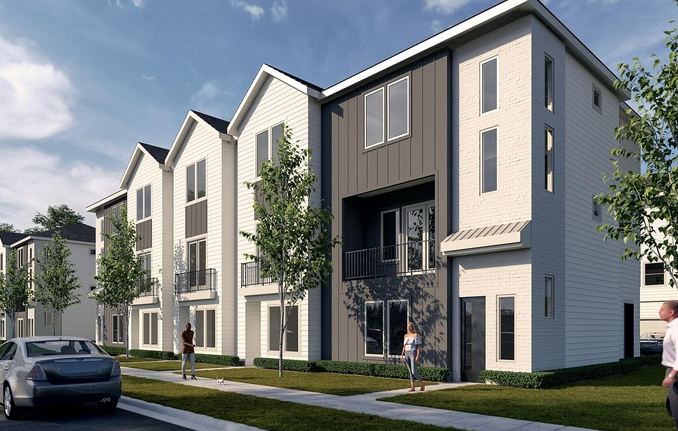Investment Property Mortgage Rates
Mortgage interest rates for single-family investment properties typically are 125 bps to 300 bps higher than conventional mortgages. In other words, if the equivalent consumer mortgage rate is 6.5%, the rate for a single-family investment property will be 7.75% to 9.5%. The tables below provide recent consumer mortgage rates. Below the tables, we explain the key reasons that interest rates tend to be higher for single-family investment properties than for conventional loans for owner-occupiers.
To help provide you with a lay of the land for investment property mortgage rates, we’re breaking down the must-have knowledge before you begin your property investment journey. To jump to a specific topic on this page, click here:
Understanding the Nuances of Investment Property Rates
Why Interest Rates are Higher on Investment and Rental Properties
Higher risk is the simplest explanation for why interest rates on investment and rental properties are higher than on a primary residence. The reasoning goes something like this — an owner-occupier will do everything in their power to make timely payments on their home mortgage to protect their source of physical shelter. While investors, too, are emotionally attached to their investment properties, the market perceives that investors are more likely to walk away if a deal turns South. The historical performance data supports the market’s perception.
The Math Behind Investment Property Rates
Below, we compare some of the key metrics on a $300,000 30-year mortgage for a consumer and an investor:
Consumer | Investor | |
Interest rate (%) | 3.5 | 5.0 |
Monthly principal & interest | $1,347 | $1,610 |
Total payments | $485,005 | $579,987 |
Total interest paid | $185,005 | $279,987 |
In the above example, the investor’s interest rate is 1.5% or 150 basis points more than the consumer interest rate. The investor’s monthly payment will be $1,610, which is $263 or approximately 30% more than the consumer’s monthly payment. Over the life of the loan, the investor will pay more than 50% more in interest than the consumer.
It is an interesting question of whether investors present that much higher risk than a consumer. Part of the explanation goes to the fact that the U.S. government plays an extremely active and supportive role in the U.S. consumer mortgage market. But for the U.S. government’s support of the U.S. consumer mortgage market, consumer mortgage rates likely would be higher and thus the gap to investor mortgage rates likely would be smaller.
What Constitutes a “Good” Investment Property Interest Rate?
A good 30-year investment property mortgage will be 100 to 400 basis points higher than the interest rate on an equivalent consumer or owner-occupier mortgage. That may sound like an extremely wide range, but where you fall in that range will depend on a variety of factors (described below) that determine the type and source of your investment property loan.
*It is also important to note that, unlike owner occupiers, real estate investors care about the rental income potential of a property. Even with a slightly higher interest rate, good real estate investor is still profiting monthly.
Contact Us To Finance Your Investment Property



How to Finance a Rental Property
Choosing a Loan Type
So, you are looking to buy an investment property and you want to compare investment property mortgage rates. What are your options? You basically have three different types of rental property loans, including:
Agency Loans
An Agency Loan is eligible to be purchased or guaranteed by Fannie Mae or Freddie Mac, often referred to as GSEs or government-sponsored enterprises. When you think of this type of investment property mortgage, you should think about the process you underwent in obtaining the mortgage on your primary residence. You will qualify based on your ability to repay the loan from all of your sources of income along with the strength of your credit. As part of the underwriting process, you’ll need to provide pay stubs, tax returns (with all of the appropriate schedules related to any investment property you own), bank statements, retirement states, and brokerage statements.
Bank Loans
A Bank Loan is not eligible for sale to or guarantee by a GSE, so the bank has to hold the loan on their balance sheet in their own loan portfolio. Most local banks focus on financing commercial real estate and small businesses. Some allocate a portion of their assets for residential mortgage lending, including on rental properties. Often these loans are reserved for existing customers.
Bank regulators frown on banks originating and holding long-term mortgages because it is hard for banks to match those mortgages with long-term financing on their balance sheet. So Bank Loans often amortize over twenty or thirty years, but often include a balloon payment after five or seven years.
The qualification requirements for a Bank Loan typically are more flexible than on an Agency Loan. The bank will require you to provide documentation sufficient for them to document your ability to repay the loan. This will include your tax returns, pay stubs (if any), and personal financial statements.
Non-QM Loans
A Non-QM loan, also referred to as a DSCR Loan or investment property loan, will have a full 30 year term and the lender will underwrite the loan based on your credit report and the monthly gross income generated by the investment property rather than your personal income. Non-QM Loans are not eligible for purchase or guarantee by a GSE, and most banks will not originate or purchase Non-QM investment property loans because they do not include underwriting the borrower’s ability to repay the loan based on their personal income.
If you’re interested in beginning the rental property loan process, contact us today to get started.
Other Investment Property Financing Options
While the three methods above are the most popular ways to obtain an investment property mortgage, real estate investors have some other options including:
• Hard money loans: A hard money loan is a short term option for investment properties. This loan type is typically used for construction projects, but can be used for rental properties as well.
• Home equity options: If you have a primary residence, you can use a home equity loan or a home equity line of credit to borrow against the equity and purchase an investment property. Keep in mind, your primary residence will be used as collateral when obtaining a home equity loan. It is essential that you keep up with each monthly mortgage payments in order to keep your home.
• Cash-out refinance: Cash-out refinancing is a great real estate investing tool and doesn’t necessarily involve your primary residence. It enables investors to pull cash out of an existing property, including an investment property, to finance their next investment. Keep in mind, there will still be a down payment and closing costs associated with the loan.
Comparing Investment or Rental Property Mortgage Rates
There are a variety of online sources of mortgage rates for Agency Rates. The table above provides an indication of current rates for primary residences. To compare investment property mortgage rates to get an idea of current rates for each of the rental loan options, take the quoted rate below and then make the following adjustments:
• Agency Loan for a rental property: +100 bps (so if the quoted rate is 3%, then add 1%, so you could expect something around 4%);
• Bank Loan: +200-400 bps (so 5%-7%); and
• Non-QM Loan: +200-400 bps.
Lenders typically also have origination and other fees. Origination fees often are calculated as a percentage of the loan amount and often are presented as “points.” One point is equal to 1% of the loan amount.
Other fees, such as an underwriting fee, may be presented as flat amounts that do not vary with loan amount. Typically, you will be able to trade a higher interest rate for lower fees, particularly origination fees. Conversely, you often can reduce your interest rate if you’re willing to pay higher upfront fees.



Other Details to Consider When Comparing Investment Property Mortgage Rates
Interest rates and fees are important when evaluating how to finance a rental property, but there are other important issues to consider.
5 Things To Know About Agency Loans
1. Self-employed beware. To qualify, you’ll likely need strong, consistent personal income from a third-party employer. These loans are difficult to obtain if you own your own business.
2. Liquid cash reserves. You will need substantial liquid reserves and the required reserves will go up as you grow your rental portfolio.
3. Liability risk. You will have to hold title to your rental property in your personal name. This means you could be sued personally if someone is injured while at your rental property.
4. Documents galore. Your lender is going to go through your income, asset, and tax return documents with a fine-toothed comb. Be prepared for a laborious process.
5. Credit score impact. Agency Loans are reported on your credit report. This can limit your ability to access other types of credit.
5 Things To Know About Bank Loans
1. Low priority. Most community banks focus on making commercial real estate loans and small business loans. While some will make residential investment property loans, it is not their bread and butter. So don’t expect a smooth process.
2. Balloons. Bank regulators don’t like banks to hold 30-year mortgages on their balance sheet. So you should expect a loan that may have a 20 or 30-year amortization, but a term of 10 years or less. This means you eventually will have to refinance the property if you don’t sell it first.
3. Deposits. A lot of banks won’t make you a loan unless you have a deposit relationship with them. Be prepared for a bank to want you to keep some cash with them if you want a rental loan.
4. Reliability. Going along with the first point above, a bank might be willing to make you a rental loan one month, and then not the next month. Bank regulators require banks to make a diversity of loans. If a bank gets overweight on real estate loans, they have to sell loans or cut back production. That means you likely will need multiple bank lenders if you plan to build a portfolio of rental properties.
5. Rates. You’d think bank rates might be low, or quite close to Agency Loans. Yet, they typically are not. Since local banks are not really set up to make rental property mortgages, they are not very efficient at it. In other words, there costs to originate a rental loan are high relative to a lender that specializes in rental loans.
6 Things To Know About Non-QM Loans
1. DSCR. Instead of qualifying on your personal income, you can qualify on the cash flow generated by the rental property. The cash flow usually is measured using the Debt-Service Coverage Ratio, or DSCR. The DSCR is monthly rent divided by the sum of the monthly payment of principal, interest, property taxes, insurance and association dues (if any), or PITIA for short. A DSCR greater than one means that the monthly rent is greater than the monthly payments. This is encouraging to lenders because it means the cash flow or rent of the property is sufficient to cover many of the monthly mortgage payments associated with the investment property.
2. Self-employed. A Non-QM Loan is for you if you’re self-employed. While a lender may ask what you do for a living, they will understand if you don’t have a normal pay stub.
3. Liability and anonymity. If you don’t want to obtain your investment property mortgage in your personal name, a Non-QM Loan is for you. By holding your rental properties in a corporate or limited liability company, or LLC, you can help shield your identity and other assets from liability.
4. Portfolios. Non-QM Loans are ideal for investors looking to build a portfolio of properties because they don’t rely on personal income to qualify.
5. Typically not reported. Most Non-QM Loans for rental properties are not reported to the credit bureaus. As a result, those loans will not negatively impact your ability to obtain other types of credit.
6. Prepayment penalties. Most Non-QM Loans will include a prepayment penalty, or PPP. These can take a variety of forms but usually, they are represented as a percentage of the unpaid balance at the time of payoff. For example, if you have a loan with a 5/4/3/2/1 PPP, if you pay off the loan in the first year, you will pay a penalty equal to 5% of the unpaid balance when you pay it off. If you pay it off in the fourth year, the penalty is 2%. If you pay it off in year six, there is no penalty. Often you can buy down or buy out the PPP by either paying more upfront in origination fees or by paying a higher interest rate. Agency Loans do not have PPPs. Bank Loans often have PPPs.



How To Improve Your Investment Property Mortgage Rate
Although interest rates are always higher on investment property loans, there are ways you can get a better interest rate.
Improve Your Credit Score
Every mortgage lender is going to have a minimum credit score, but usually the higher your credit score the better the interest rates become. To learn how to improve your credit score, check out our guide.
Increase Your Down Payment
Typically the minimum down payment is accompanied by the highest investment property loan rates. If you are able to increase your down payment and improve your LTV, you can also improve your rates.
Buy Down Your Rate
Often investment property rates can be bought down by paying higher fees. Investors who plan to buy an investment property and hold onto it long term will also often buy their rate down. However, if a real estate investor wants to sell the property in the near future, it might not be worth it to buy down the mortgage rate.
How to Improve Your Monthly Payments
If you are unable to utilize the above methods to get a better investment mortgage rate, do not worry. There are still ways to ensure your rental property is profitable.
Increase Your Rental Income
This is the simplest way to be able to cover a higher rate. The more rental income you can charge, the more money you have to make your monthly payments.
Fight Your Property Taxes and Shop Homeowners Insurance
In addition to making more money, reducing your expenses will optimize your monthly gross income. Similar to your primary residence, you can fight your taxes each year and shop insurance policies.
Our Loan Programs are Designed for Professional Investors



Rental Loans
Hold forever or sell at the right time; A dramatically simplified qualification process



Vacation Rentals
Underwritten using short-term rents; ideal for business owners and self-employed borrowers